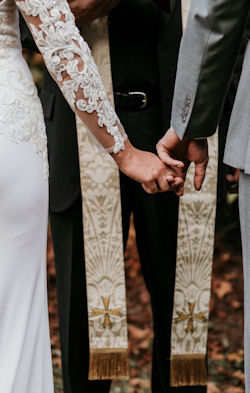Civil Celebrants and Clergy - what's the difference and does it matter?
 The Marriage Act differentiates
between Clergy and Civil Celebrants (Authorised
Marriage Celebrants) in what they can and can't do. So,
what is the difference between civil celebrants and
clergy, and, if you are planning to marry, does it
matter?
The Marriage Act differentiates
between Clergy and Civil Celebrants (Authorised
Marriage Celebrants) in what they can and can't do. So,
what is the difference between civil celebrants and
clergy, and, if you are planning to marry, does it
matter?The most basic difference
out
The most basic difference is that Civil Celebrants can
conduct personal and personalised marriage ceremonies
anywhere in Australia, indoors and out, 24/7, in public
or private spaces. Clergy, on the other hand, are
restricted to conducting services, approved by their
denomination, within the rules of their denomination.
All ordained clergy can conduct such marriage services,
but only those licensed to do so (by their denomination
putting them forward to the Registry Office in their
state) can conduct a religious marriage ceremony that is
also a legal marriage. ALL legal marriages are governed
by the Marriage Act, a secular Act that, to coin a
phrase, allows religious entities to solemnise marriages
on what is basically and outsourcing arrangement!Licence to discriminate
out
Clergy are permitted, as employees of their
denomination, to refuse to marry couples who do not
comply with the tenets of that religion. If you are
divorced, wishing to marry someone of the same sex, not
an adherent of the religion or a member of a particular
congregation, not baptised, not confirmed, living "in
sin" together, or an ordained priest may be grounds on
which a clergy person is not permitted by the particular
faith to marry you. Not all religions ban marriages on
the grounds of all of the above, but some do.So what is the effect of a clergy person deciding to "resign" from being licensed because he/she does not approve of marriage equality? Basically, for most marrying couples, nothing much, given that civil celebrants continue to conduct 3 out of 4 marriage ceremonies, with the proportion conducted by authorised celebrants rising every year.
For adherents of that denomination who are parishioners, of course, what it means is that they cannot marry legally in church. But they can marry legally in a civil ceremony conducted by a civil marriage celebrant or at a Registry Office or Courthouse and then subsequently have a church marriage service or blessing service as long as
- they inform the clergy person that they are already married
- no legal paperwork is done and no certificates issued
- that church service is not registered as a legal marriage
Religious Marriage Celebrants
out
Following the change in the Marriage Act that
implemented marriage equality, a new category of
marriage celebrant was created. Religious Marriage
Celebrants are celebrants, appointed by the Attorney
General, who are indemnified against being charged or
sued for unlawful discrimination if they refuse to marry
a couple because of their own religious beliefs. They
are required to state that they are Religious Marriage
Celebrants in all advertising. As they age out the
numbers will drop as only those who were already
authorised celebrants on the date the changes to the Act
were passed could opt to change their category.Did you enjoy reading this post? Let's talk about how we can make your dream wedding a reality.
